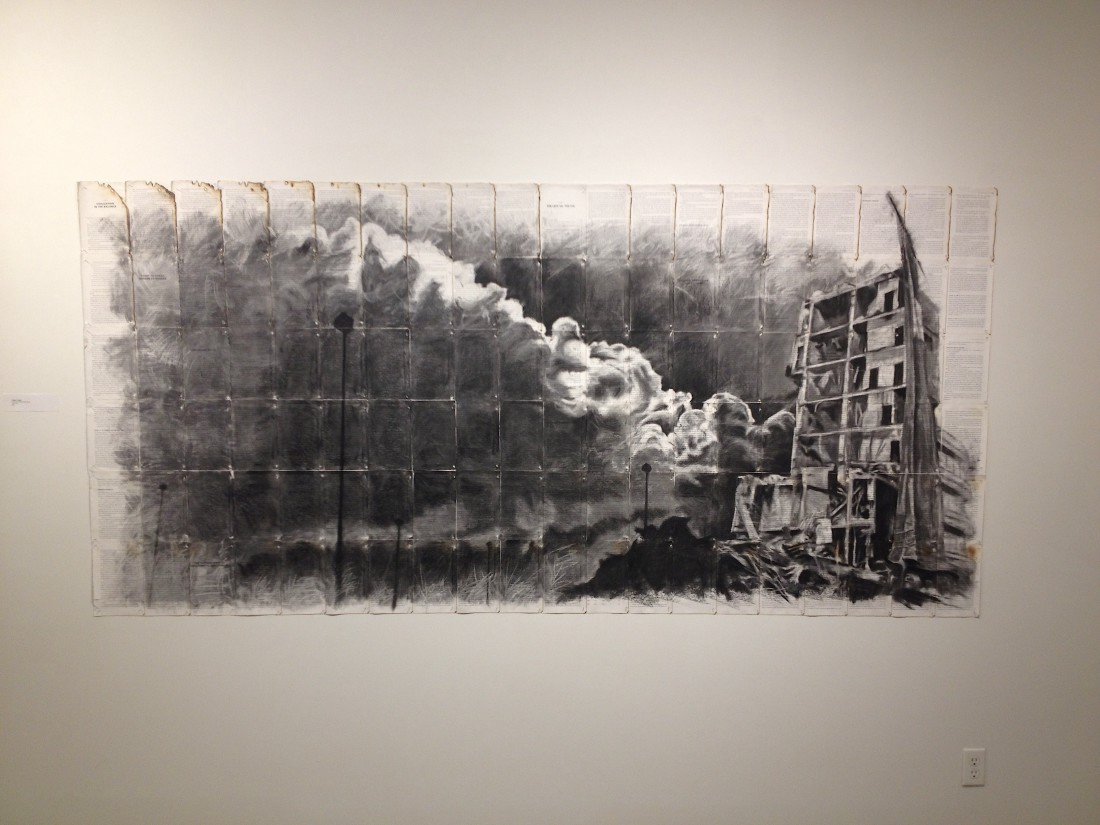Time is of the essence for two current solo exhibitions. Dox Trash, An American Journey: Georgia to Philadelphia, organized by the Dolan/Maxwell Gallery and Georgia College Museum of Art is at the Asheville Art Museum; Twenty Years Progress, new works by local artist Tom Pazderka, is at Pink Dog Creative. Each sets the stage for a not-so-distant past and present.
Dox Thrash
The 38 watercolors and prints in Dox Thrash are, at their core, a snapshot of the Georgia-born, African-American artist’s life. But they simultaneously offer a comparative view of the individual in post-Depression urban and rural life.
Thrash quit school after the fourth grade and moved north at age 15. He toured with a vaudeville troupe, pursued an education at the School of the Art Institute of Chicago and ultimately made his career as a printmaker in Philadelphia. In 1937, he joined the Philadelphia Fine Print Workshop, a division of the Works Progress Administration’s Federal Art Project, and developed carborundum printmaking, an etching technique that he would use throughout the rest of his working life.
Carborundum prints are known for the depth of their inky, jet-black tones. The technique involves pressing carborundum crystals into copper etching plates. When burnished, the plates take on a hazy appearance that leaves subjects obscured by darkness, aka chiaroscuro.In “Siesta,” Thrash portrayed a reclining nude, only it seems that he’;s barely touched the plate. The figure stretches across a bed, with only the faint hint of light grazing her curved hip and extending up her left arm.
Thrash’s watercolors, like his etchings, aid in developing a larger image of the individual within the social landscape. They also take aim at the ups and downs of urban work life. The congested nature of city living is alive in “Row Houses.” Buildings are clumped together, surround by narrow streets. A sea of telephone poles pokes above the roofline. To add to the visual frenzy, the image is viewed from the window of a passing train.
Labor disputes take center stage in “Untitled (Strike).” A central, Herculean figure towers above a sign-holding crowd. He’s easily twice their size, a neighborhood icon or hero. The placards below him dispute the need for war, diminish Wall Street and even mention the 1930s landmark trial of the Scottsboro Boys.
Though Thrash never made a permanent return to the South, he did reimagine the countryside and regional turmoil of his youth. A series of etchings recalls dilapidated barns and rural pastures. A cabin, tucked off a dirt road, features a small wartime flag hanging from the porch. Thrash employs the carborundum’s darkness with eerie attention in “After the Lynching.” The print shows two men carrying a limp body to his or her grave. Only a foot and the faint shape of a hand can be made out. In the background, a mother and child stand close by. They’re likely family, judging by their distraught looks, but it’s too dark to tell. It would seem that even the moon is withholding its light in the evening scene.
View Dox Thrash, An American Journey: Georgia to Philadelphia through Sunday, Sept. 7, at the Asheville Art Museum. ashevilleart.org
Tom Pazderka
Twenty Years Progress is as much about the last 20 years as it is about this very moment. And “progress” is a misnomer. The show, by Asheville-based artist Tom Pazderka, features nine large-scale drawings that reflect a critical, and at times caustic, look at a series of historical events. Six of those works, each a black-and-white image drawn on the dissected pages of burned books, were created during a spring 2014 artist’s residency at the Trafo Studios in Pazderka’s native Prague. In those works, he pits the past against the present, panel for panel.
Three panels form a triptych-like collection titled “Elegies to the Failed Revolutions.” Each one depicts the result of ill-considered actions. The 1993 siege at Waco, Texas, is viewed as a pile of rubble. A charred structural frame recalls a series of mid-1990s church burnings in Norway. The Alfred P. Murrah Federal Building stares vacantly after the 1995 Oklahoma City bombing.
Pazderka views these events through professor Alain Badiou’s philosophical filter (every event can affect the future and the way we perceive past, present and future events). Though these incidents may at first seem unrelated, when viewed through Badiou’s lens, Pazderka says they clearly have taken a permanent place in our memories, and even the way we behave. “Historically, they are still with us,” he says. “Events in our past signal how we view the present.”
Along with the past, Pazderka considers the current moment as well. In “Falling Twilight,” a 6-foot-wide billowing black cloud is encroaching on a half-demolished building, the former Prague home of The Red Law, a defunct communist propaganda newspaper in Prague. “Cloud(s)1” and “Cloud(s)2” take similar aim. “It’s about our movement of information from books and paper, physical materials, to the digital atmosphere,” Pazderka says. “The clouds, they’re an event in the making.”
View Twenty Years of Progress though August at Pink Dog Creative, 348 Depot Street. tompazderka.com



Before you comment
The comments section is here to provide a platform for civil dialogue on the issues we face together as a local community. Xpress is committed to offering this platform for all voices, but when the tone of the discussion gets nasty or strays off topic, we believe many people choose not to participate. Xpress editors are determined to moderate comments to ensure a constructive interchange is maintained. All comments judged not to be in keeping with the spirit of civil discourse will be removed and repeat violators will be banned. See here for our terms of service. Thank you for being part of this effort to promote respectful discussion.